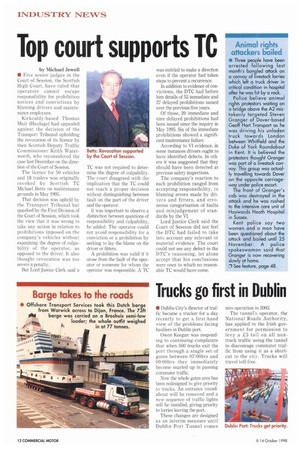Top court supports TC
Page 14

If you've noticed an error in this article please click here to report it so we can fix it.
by Michael Jewell • Five senior judges in the Court of Session, the Scottish High Court, have ruled that operators cannot escape responsibility for prohibition notices and convictions by blaming drivers and maintenance employees.
Kirkcaldy-based Thomas Muir (Haulage) had appealed against the decision of the Transport Tribunal upholding the revocation of its licence by then Scottish Deputy Traffic Commissioner Keith Waterworth, who reconsidered the case last December on the direction of the Court of Session.
The licence for 50 vehicles and 18 trailers was originally revoked by Scottish TC Michael Betts on maintenance grounds in May 1995.
That decision was upheld by the Transport Tribunal but quashed by the First Division of the Court of Session, which took the view that it was wrong to take any action in relation to prohibitions imposed on the company's vehicles without examining the degree of culpability of the operator, as opposed to the driver. It also thought revocation was too severe a penalty.
But Lord Justice Clerk said a TC was not required to determine the degree of culpability. The court disagreed with the implication that the TC could not reach a proper decision without distinguishing between fault on the part of the driver and the operator.
It was important to observe a distinction between questions of responsibility and culpability, he added. The operator could not avoid responsibility for a conviction or a prohibition by seeking to lay the blame on the driver or fitters.
A prohibition was valid if it arose from the fault of the operator or someone for whom the operator was responsible. A TC was entitled to make a direction even if the operator had taken steps to prevent a recurrence.
In addition to evidence of convictions, the DTC had before him details of 53 immediate and 27 delayed prohibitions issued over the previous five years.
Of those, 20 immediate and nine delayed prohibitions had been issued since the inquiry in May 1995. Six of the immediate prohibitions showed a significant maintenance failure.
According to VI evidence, in some instances drivers ought to have identified defects. In others it was suggested that they should have been detected at previous safety inspections.
The company's reaction to each prohibition ranged from accepting responsibility, to blaming errors made by drivers and fitters, and erroneous categorisation of faults and misjudgement of standards by the VI.
Lord Justice Clerk said the Court of Session did not feel the DTC had failed to take into account any relevant or material evidence. The court could not see any defect in the DTC's reasoning, let alone accept that his conclusions were ones to which no reasonable TC would have come.


























































































































